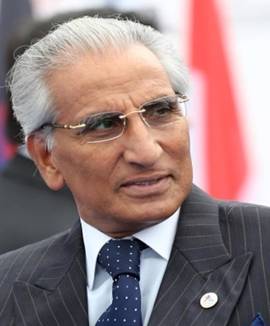
South Asia, home to a fifth of mankind and covering about 3.4% of the world's land mass, is often described as the most dangerous place on earth. Being the most populated region in the world, it is also one of the poorest regions and least economically integrated. Over half a century after independence, the nations of South Asia remain mired in a vicious cycle of poverty, with deprivation and underdevelopment providing a fertile ground for intolerance and extremism – which in turn promotes conflict and violence. The region’s vulnerabilities are enhanced by political, economic and social instabilities as well as an increasingly difficult security environment.
South Asia needs to overcome the bitter legacies of the past in order to create an enabling environment for peace and security, which is critical to unleash the synergies necessary for economic progress. There can be little doubt about the economic benefits to the global economy from a peaceful and stable South Asia, or indeed the promising peace dividend for the people of the region.
Currently negotiating one of the most critical transitions in its history, Pakistan sees national security and regional economic security to be an indispensable component of peace and stability within and outside its borders. That is why the policy of ‘Peace for Development’ as outlined by Prime Minister Muhammad Nawaz Sharif means building a peaceful external environment so that South Asia could realize its potential as a stable, robust and progressive region.
Please be welcome to this seminar, where Special Assistant to the Prime Minister of Pakistan on Foreign Affairs, Syed Tariq Fatemi, will give a talk on the challenges of regional security in South Asia and its global prospects.
Chair: Kristian Berg Harpviken, PRIO Director.
- TariqFatemi (born July 9, 1944 in Dhaka, Bangladesh) is a seasoned diplomat and geo-strategist.
- Acareer diplomat for over 35 years, he held various diplomatic assignments inPakistan Missions abroad, including Moscow (twice), New York, Washington(twice), and Beijing. He was Additional Foreign Secretary (Americas and EuropeDivisions), and later worked in the Prime Minister's Office in charge ofDefense, Defense Production and Foreign Affairs. Later, he was promoted to thehighest rank in the country's civil service, that of a Federal Secretary.
- Adelegate to the UN General Assembly Sessions from 1982 to 1986, he also attendednumerous Non-Aligned and OIC Conferences, while also being involved in the UN-sponsored Geneva negotiations on Afghanistan in the mid-80s.
- Heserved as High Commissioner (Ambassador) of Pakistan to Zimbabwe, withconcurrent accreditation to Angola, Botswana, Namibia and Zambia. Later, heserved as Ambassador to the United States, Jordan, Belgium and Luxembourg andfinally, to the European Union (Brussels), from where he retired in 2004.
- Onretirement, he joined the Pakistan Muslim League (N), assisting the Party onforeign policy matters. He also taught at the Foreign Service Academy, theNational Defence University, the Administrative Staff College and otherinstitutions.





